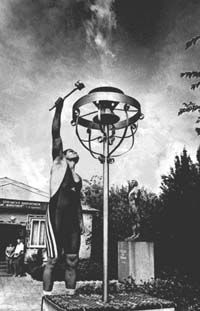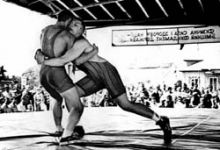The sports extravaganza began with a relay race. Among those who finished first were deputies of the local Chornobai council, Masters of Sports Hryhory Mazur and Mykola Chekal; Candidate Master of Sports in cycling and skiing as well as chief of the urban development, architecture, and public utilities department at the District State Administration Ivan Trokhymenko; Novoukrayinka Mayor Volodymyr Volosian; Maloburimske Agricultural Enterprise General Manager Ivan Hryshko; Kolos Ltd. plant maintenance manager Volodymyr Tarasenko; and many others.
“Holding wrestling tournaments is a local tradition,” says Petro Dusheiko, chair of the Chornobai district administration. “Nobody is forced. People are well aware that within a healthy body is a healthy spirit. I myself do physical exercises every day, for I am convinced that if a district functionary is in shape and good spirits, his subordinates will work better.”
FIGHT AND WIN
I was leaving for Chornobai district as if I were going abroad: the region appeared simultaneously native and foreign. They reap the oblast’s richest grain harvests, they have maintained animal husbandry: instead of slaughtering the livestock and destroying the farms, they milk the cows and raise their pigs. They have kept the infirmaries, hospitals, clubs, and schools open. The peasants work and are paid on time. The local district administration chairman lives in a village, not a district center manor, and farms himself. A considerable part of the district’s ruling elite actively takes part in sports – in real life, not on paper. After all, it is this place that has held for a number of years the Ivan Piddubny Prize National Holiday of Heroic Strength.
This time Krasenivka has marshaled over sixty athletes from Ukraine’s oblast and district centers and even two Russian teams from Belgorod and Moscow. Moscow coach Kopayev told The Day their team had been put together on the personal instruction of Mayor Yury Luzhkov. The point is that the village and district authorities had sent an online invitation letter to the Russian capital. The Krasenivka tournament having a high rating, Moscow sent in one of the CIS’s strongest wrestling teams. What also caused quite a stir was the excellent performance of the Mykolayiv team.
HALF THE VILLAGE ARE PIDDUBNYS
The feast was visited by Ivan Piddubny’s descendants Vasyl and Hennady Bardyk (grandson and great grandson by his brother Mytrofan). It took them as long as three days to arrive from Kazakhstan’s Kustanai oblast.
“It turned out that half the Krasenivka villagers are my relatives,” Hennady Bardyk said. “It would take my uncle and me over a month to call on all of them. But this is not the point. The point is that people here remember and revere their hero. Incidentally, the Soviet regime did not allow erecting an Ivan Piddubny monument at Krasenivka, for he and his family were ‘kulaks’ and even ‘enemies of the people.’ Now that I am looking, overwhelmed with emotions, at the monument the villagers built to my great-grandfather and at the museum exhibits I feel deep emotion when I come to think that I have also something to do with this great man.”
This year’s festival featured a brilliant competition in Greco-Roman wrestling. The Krasenivka function is also an excellent occasion to gather masters of other sports who were born there and achieved major results, as well as physical culture and sports veterans. The honor of carrying the feast’s flag was assigned to Andriy Khimich, Olympic rowing champion and coach; Vsevolod Babenko, world, European, and Ukrainian champion in power lifting among veterans; and other prominent athletes. The right to light the competition flame was given to Kyiv wrestler Serhiy Chyzhov, all-round champion at last year’s Piddubny meet.
The organizers believe the country should know its heroes, if only to avoid a situation like that with Ivan Piddubny who was known abroad as a Russian wrestler for almost a century. Very few recalled that the six-time world champion, who overcame so many masters, came from the small village of Krasenivka in the Chornobai district. Veteran athletes should be respected and venerated not only on festive but also on ordinary days. One should not wait for the moment when an individual’s merits can be discussed only in the past tense.
Greeting the fete participants, Archbishop Sofrony of Cherkasy and Kaniv, emphasized, “Let us struggle and remember the way it was done by our fathers and grandfathers. Fight on, and the victory will always be yours.”
The Greco-Roman wrestling competition consisted of two stages. The situation in the junior group in fact became quite clear after the first round: eight out of nine top prizes were grabbed by the Ukrainians, with five of them from Cherkasy oblast. Only one Belgorod teenager managed to squeeze in among our boys, finishing third in the 32 kilogram category. But the Russians decided to take a revenge in the adult competition, with Vladimir Bolshakov topping the bill in the 66 kg. category. It looked like a good beginning, and the Muscovites were determined to “break our athletes like eggs.” But they failed to work any miracles: Muscovites Nikolai Dugin and Berdia Gergidava had to content themselves with the bronze in the 74 kg. and 96 kg. categories. On the other hand, nobody could beat Moscow super heavyweight (over 96 kg) wrestler Vyacheslav Belmas. Yet, our Cherkasy native Andriy Shevchenko took to the mat one and all in the under-96 kg. category, Roman Rahushenko won the gold among those under 76 kg, and, in the under-84 kg. category, David Manukian from Transcarpathia, who had finished second in Europe last year and fourth at the Sydney Olympics, was again up to the mark.
All predicted, not without reason, the overall championship for Russia’s Belmas: he had just pinned another powerful super heavyweight, Kostiantyn Yermakov from Sevastopol. Yet, the Russian either overestimated his strength or decided to slow down in the final match, which allowed Serhiy Poberezhnyk from Mykolayiv, hitherto in the shadow, to be catapulted to glory.
ROAST PIGLET AS PRIZE
Surely, the Krasenivka fete was not confined to the wrestling tournament alone. What aroused no less interest among the uninitiated audiences were competitions in such so-called folk sports as tug-of- war, arm wrestling, mini soccer, boxing on a tree log, walking on hands, truck-heaving, carrying sandbags, and weightlifting. Do you think an average man could pull a five ton truck with a strip of cloth? As it happens, one can even heave such a vehicle 28 meters. Viktor Yurchenko from Zolotonosha drew well-deserved applause for doing so before the eyes of numerous spectators.
Krasenivka born schoolboy Oleksiy Nikitchenko also considers himself a descendant of the famed wrestler. Yet, he has thus far distinguished himself in the somewhat exotic sport of walking on hands. And he can do it phenomenally. Nobody could beat him walking as far as 65 meters.
Serhiy Poberezhnyk sported the laurels of all-round champion for only a short time. He suddenly decided to take part in boxing on a tree log but failed to beat Vyacheslav Chernenko from the village of Vasiutyntsi, Chornobai district. The judges wisely awarded the first prize, a case of beer and smoked breams, to both.
It was the mini soccer tournament that drew the biggest audiences. The competition was won by the Chornobai district center veterans team, which was given a roast piglet as the grand prix.
The real moving force of the Krasenivka holiday of epic strength is Petro Dusheiko, chairman of the Chornobai district administration. As a former Verkhovna Rada deputy, he was able to restore the tournament in Ivan Piddubny’s homeland. He also found the support of many well- established firms, organizations, and banks. The Kyiv-based Pushcha-Vodytsia Agricultural Combine is considered the chief sponsor. Krasenivka enthusiasts also receive constant aid from the Savings Bank of Ukraine and the Feodosiya Commercial Seaport (Piddubny used to tour these places).
“The holiday requires official status,” Mr. Dusheiko believes. “You won’t go far on enthusiasm alone. What we need is adequate financing, a prize fund, and social development resources. This done, we would attract athletes from not only Russia but also Germany, Britain, and France, where our Ukrainian hero repeatedly appeared.”
* * *
We, as a rule, opt for extremes. People either slave away from sun to sun without respite or a glimmer of hope, or else they do nothing but have a good time, i.e., go to concerts, tour, or arrange sports pageants. Visiting Chornobai district, I saw, perhaps for the first time during the past decade, people who know equally well how to work hard and have fun. The district is traditionally the oblast’s top agricultural producer. This year they reaped the oblast’s best early grain harvest.
“It’s been like this since the times of our great-grandfathers,” recalls Mykhailo Lesechko from the village of Lykholity and Master of Sports, the oblast’s first rural Greco-Roman wrestling champion. “I used to work as a wagon driver and tour the district as part of a wrestling team. I felt I was strong, why should I suppress myself? I worked and practiced sports, for the sap of my youth was rising. And what else does a person need? I need to meet my peers, those who are, like me, over seventy. I look at and cheer up young athletes, and then why not take a shot? For this is where our roots are, our strength, and joy of life.”









